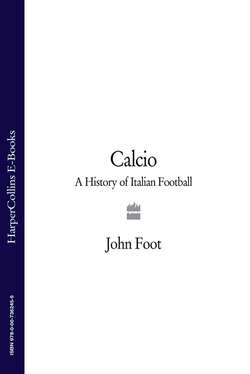Читать книгу Calcio: A History of Italian Football - John Foot - Страница 30
Calcio and Italian capitalism
ОглавлениеFrom the very beginning, Italy’s business leaders were interested in calcio. One of the founders of AC Milan was Piero Pirelli, industrialist and part of the huge Pirelli rubber business set up in the city in 1872. Pirelli ran Milan from 1908 to 1929 and was responsible for the construction of the San Siro stadium in 1926. Senatore Borletti, another Milanese industrialist with various interests in the city (alarm clocks, bullets, watches, department stores, basketball), was president of Inter from 1926 to 1929. Most important of all, however, was the role of FIAT. Formed in 1899 in Turin, by the end of World War One FIAT had become one of Italy’s biggest companies. By the 1920s, FIAT was producing 90 per cent of Italy’s cars and the Agnelli family controlled 70 per cent of the company. In 1923, Edoardo Agnelli (who was just over 30 at the time) took control of Juventus and remained president until 1935, overseeing a series of astonishing victories in the 1930s. Edoardo was the son of Giovanni Agnelli, founder of the company. FIAT have been linked to Juventus ever since. Edoardo used to take his son Gianni with him to the stadium, and Gianni Agnelli was part of Juve’s history until his death in 2003.39
In a way that is unique, Italy’s biggest company has run Italy’s biggest football club, and this alliance has created love, hate, loyalty and jealousy in equal measure. FIAT’s wealth, and its business ethics, made Juve into the greatest producer of victories in Italian football, with a fan-base that spread across the whole country and dwarfed that of the other clubs. FIAT used Juventus to make money, but also to create consensus and popularity, with Turin workers but above all among ordinary Italians across the peninsula. Every victory was identified with the car company that paid the players’ wages. By the 1930s Juventus could count on a fan-base bigger than that of all the other clubs put together.
